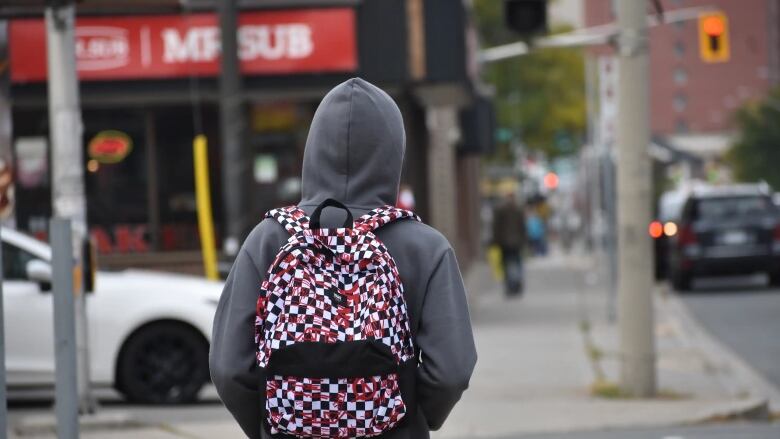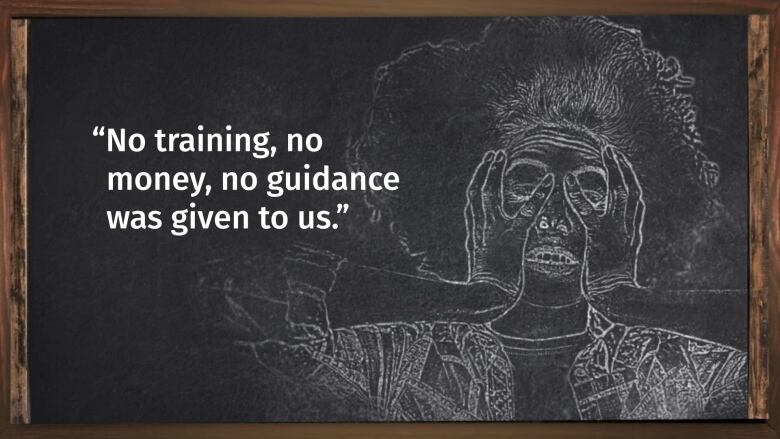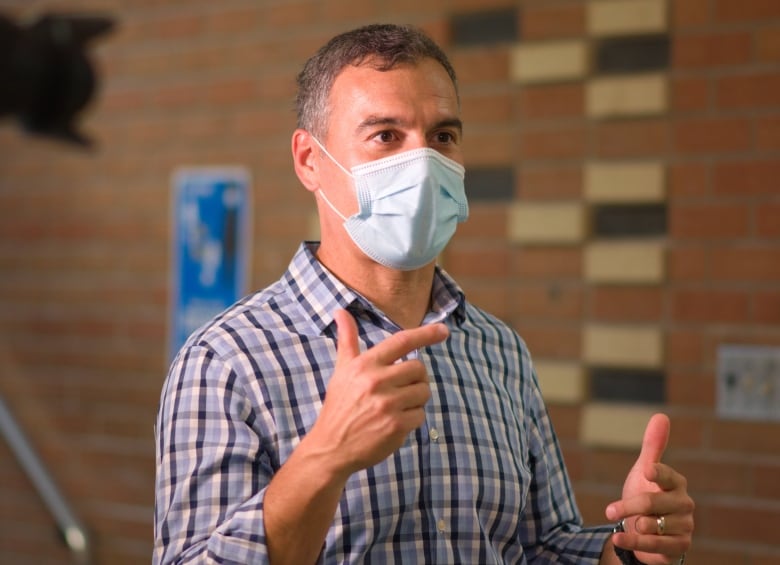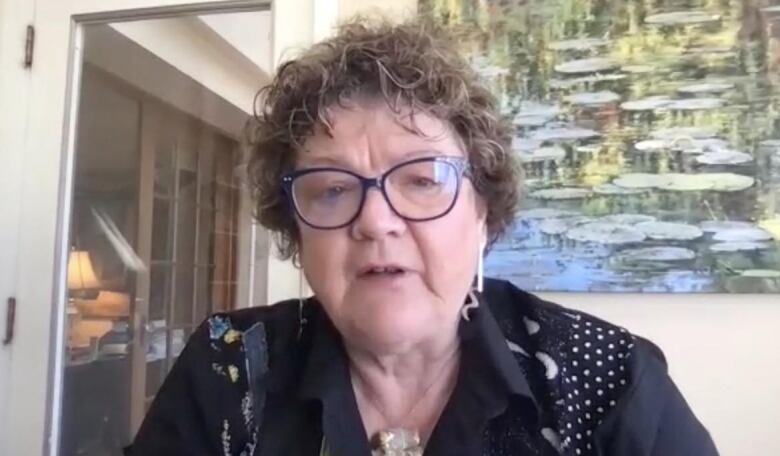Students have fallen behind during the pandemic, teachers say, and some may never catch up
Roughly 70% of 684 local educators in a CBC News questionnaire say some kids won't catch up academically

This story is part of a CBC Newsseriesexamining the stresses the pandemic has placed on educators and the school system.For the series,CBC Newssent a questionnaire to thousands of education professionals to find out how they and their students are doing in this extraordinary school year. Nearly 9,500 educators responded. Read more stories in this serieshere.
Anna Hulskramer says online learning hasn't been easy for her kids.
Her 13-year-old son, NathanFilmore and 14-year-old daughter, EmilyParsons, are inHamilton-Wentworth Catholic District School Board (HWCDSB)and say they've struggled.
"I got an email from my son's teacher which stated he was behind on 15 different assignments ... Emily, she's failing her English[class] with a 33 per cent,"Hulskramer said.
"I thought Grade 9 was going to be a good year," Emily said. "But no."
A new exclusive questionnaire with responses from hundreds of local educatorsshowstheir situation isn't unusual.
CBC News sent the questions to thousands of education professionals to find out how they and their students are doing in this extraordinary school year. Nearly 9,500 responded.
The HWCDSBwasn't surveyed, but Hulskramer's experienceresembles what others in local school boards are facing.
Some 70 per cent of 684 school staff from school boards in Hamilton,Halton,Niagaraand Brantford think some studentswon't catch up academically.
SchoolsUnder Stress
Today: The academic impact on Hamilton-area students
Tuesday: The impact on student and teacher mental health
Wednesday: Vaccines and their future in the school system
Roughly77 per cent of educatorspolledalso saidthey weren't on track to finish teachingthe required curriculum, and 61 per cent said fewer students were meeting learning needs compared to past years.
The results followmonths of constant jumpsbetween in-person learning and remote learning. Most students in the region haven't been inside a classroom since the April break. Some haven't seen a classroom for 14 months.
Students and teachers falling behind
Nathan, in Grade 7, saidhis computer struggles to run school programs because of internetissues. He addedhe barely hears from friendsanymore.
Emily, in Grade 9, said she hasheard from friendsand they're also falling behind. She said her teachers have missed entire units in math, English andscience.
Bailey Patterson has a daughter in Grade 8 and son in senior kindergarten in Niagara. She said she worries their social skills will suffer because of online learning, and is especially worried about her son.
"I don't feel like he's learning what he needs to learn to be successful in Grade 1," she said.
Cindy Gage,theOntario Secondary School Teachers' Federation bargaining unit president for Halton teachers, said it's been hard for teachers too.
She said despite the number of students passing and failing this year not changingmuch from last year,educatorshave missed parts of the curriculumand couldn't teachin the same fulsome way they usually would face-to-face.
"Many grades, and grading and feedback, given to studentswas with ahealthy dose of compassion and understanding," Gage said.
Some educators said they didn't feel supported by their school boards and the province.

"The flip flopping teachers have had to do has caused an incredible amount of stress," one said in a comment.
"The creation of in class material to online interactive material takes hours and hours of time. I'm not sure when the government ever expected this to happen unless it was on our own time in the evenings and on weekends. Which is what's happened. The disappointment and anger from teachers about how this has been handledis very real."
One educator said they spent more than $1,000 of their own money on a new computer and other materials to teach kidsremotely.
"This year has been extremelyemotionally and mentally draining on teachers ...No training, no money, no guidance was given to us."
Some online students are cheating, missing class
Of the teachersquestioned, 69 per centsaid some students have stopped attending class altogether and 67 per cent were concernedstudents learning online were cheating.
Hulskramersaid the stats on cheating hit close to home.

Emily was in an online chatroom with classmates where they would share answers during tests.Hulskramersaidthey got caught and failed the test.
But Emily said othersare still cheating usingSnapchat group chats.
"Every time they had a test, they would all cheat on it," she said.
While some students have thrived and haven'tcheated, Jeff Sorensen, Hamilton-Wentworth Elementary Teachers' Local unionpresident, said thequestionnaireresultsshow online learning can'tprovide a quality education for all students.
"We see a lot of absences. We see a lot of black rectangles [on screens] ... and we know students aren't listening," he said. "They're probably in another room playing video games. It's hard for me to blame kids for that though."
Sorensen also said he's concerned about how this affects students from equity-seeking communities.
Buthe's also optimistic students will be able to catch up and said he knows teachers will work hard to help them.
Prioritizing parts of curriculum is key: school board directors
Halton District School Board director Stuart Miller said while some students have done well and others may not need a lot of catching up to do, he believesthere will be gaps in learning, achievementand socialization.
"I'm concerned in particular with our younger students around literacy and numeracy. There may be gaps that take some time ... a lot of our work next year will be focused on that. How big those gaps are? I don't know."
Hamilton-Wentworth District School Board directorMannyFigueiredosaid it'll be key to prioritize various parts of the curriculum, especially because students may be too worn out tolearn in the summer.

"It's going to force us to look at what is the critical content we have to cover," he said. "Another thing our board is looking at ... how can we try to lower class sizes in elementary so teachers can provide a little more personal attention?"
The Grand Erie District School Board declinedinterview requests, but said in a statementit recognizedit's been a challenging year.The District School Board of Niagara declined requests for comment, and Halton Catholic District School Board also didn't respond to requests for comment.
Experts say it's time to rethink education system
LouisVolante, aBrock Universityeducational studies professorand president of the Canadian Educational Researchers'Association, said the poll resultsalign with the rest of the world.
"The academic losses are significant. We're seeing in some of the research on learning loss from different parts of the worldit can be 15, 20 per cent in math ... in reading," he said.
Dr. Jean Clinton, a psychiatrist and McMaster University clinical professor in the psychiatry and behavioural neurosciences department,said the poll results show school boards are putting too much pressure on educators to teach as much of the curriculum as possible instead of focusing on essentials.

She said it's time to revise the education system, and says she's speaking with Ontario's education minister about it this week.
"We're looking at kids' academic achievement for sure but in ways they get excitedabout their learning that they wouldn't even think about cheating ... but also has a big focus on social and emotional well-being," Clinton said.
WATCH: Education expert explainshow student learning can evolve
Volante also said it's time to rethink how educatorsteach.
While school boards shouldn't abandon traditional teaching methods, he said there needs to be moreauthentic, preformativeevaluations, likeplaying instruments in music and playing sports in physical education
"There is an opportunity. It does require a little bit more preparationto teach from that perspective and the marking can be more onerous," he said.
"Students still need to know how to write a test, if for no other reason thanthat's what they're going to experience in college and university ... But I think it's a question of balance."
About the questionnaire
The questionnaire was sentto 52,351 email addresses of school workers in eight different provinces, across nearly 200 school districts. Email addresses were scraped from school websites that publicly listed them. The questionnaire was sent using SurveyMonkey.
Theprovinces and school districts were chosenbased on interest by regional CBC bureaus and availability of email addresses. As such, this questionnaire is not a representative survey of educators in Canada. None of the questions were mandatory, and not all respondents answered all of the questions.
(Data analysis: Roberto Rocha and Dexter McMillan)
Attention parents, students and teachers: We want to hear from you!
We hope you'll use this form to tell us about school conditions, how classes are going or whatever other pressing issues are on your mindin Hamilton, Niagara, St. Catharines and Burlington.













_(720p).jpg)


 OFFICIAL HD MUSIC VIDEO.jpg)
.jpg)



























































































